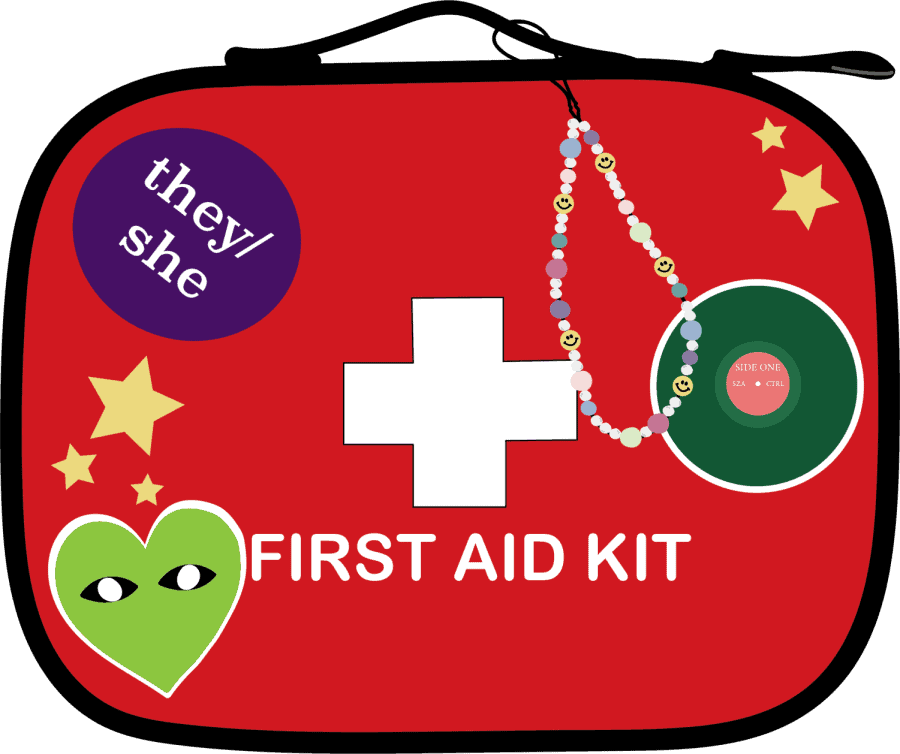Taking your health into your own hands: How to make a medical kit for your dorm
August 8, 2022
For many, college is the first step into adulthood. Whether freshmen are living on their own for the first time or not, many students may have questions about how to live and survive while they’re miles from home.
Most people know the steps to staying healthy: eating fruits and vegetables, drinking water, and exercising. But some people’s knowledge might fall short when it comes to caring for themselves medically, whether that means going to the doctor or having the supplies available for when you do inevitably come across a health emergency. Being prepared with the knowledge to make decisions about your body and how to take care of yourself at home will ensure that you stay as healthy as possible.
FIRST AID
When many people think about medical kits, the classic red cross first aid kits might come to mind. While a general first aid kit won’t have everything you need for a dorm room, it most likely will have enough to deal with minor cuts and scrapes and to stop bleeding or infection while you’re on your way to a doctor.
If you want to make your own emergency first aid kit, there are several key items to include. After getting injured minorly, it’s smart to disinfect the wound so it doesn’t get infected. The best and most well-known products are Neosporin ointment, rubbing alcohol or hydrogen peroxide, and bacitracin.
Whether your band-aids are “Hello Kitty” themed or nude-colored, these first aid staples are must-haves when starting your medical kit. To make sure you’re prepared for every situation, try to get multiple sizes of band-aids so you can cover everything from blisters to minor cuts. If you’re blister-prone or a fan of wearing uncomfortable shoes, blister pads may also be a good addition to your kit.
Some wounds might not be contained by a band aid alone though. Make sure to include gauze pads for larger wounds and a roll of gauze or elastic bandage to make sure the pads don’t budge. For extra reinforcement, include a roll of surgical tape in your kit so you can tape gauze pads to injuries.
While most cuts and wounds can be treated at home, this isn’t always the case. According to Orlando Health, if bleeding cannot be stopped after ten minutes of pressure, you cannot feel or move the injured area, and if the wound is deeper than a half an inch, see a medical professional immediately.
If the wound is spurting blood, has visible bone, tendon or veins, has an embedded object or has torn edges, then call 911 or go to the emergency room over an urgent care or medical facility such as the Student Health Center.
FLU AND COLD
College is known as a breeding ground for illnesses such as the flu and cold, and now, COVID-19. In fact, according to Statista, 64% of adults aged 18 to 30 contract one to three colds per year. While the flu is different every year and can be curbed by the flu shot, most years around 5% to 20% of the U.S. population contract the flu.
With rumors and talks of the “freshman plague” that stems from living near thousands of other students, it might be smart to include vitamin C supplements in your medical kit to give your body a little extra help when fighting dormitory germs. Popular brands include Emergen-C, which comes in pills, gummies and powdered drink mixes. On top of this, many brands have daily gummies and pills with immune-boosting properties, such as elderberry.
To prepare for the odds of contracting colds and flus, as well as COVID-19, make sure to have a thermometer on hand so you can monitor your temperature. The most accurate thermometers are typically digital ones, but you can choose whether you prefer one that is done orally, in the ear, or somewhere else on the body.
While temperature can fluctuate depending on the person, the average temperature is 98.6 degrees Fahrenheit. If you’re above this, then you have a fever and should monitor your temperature and symptoms. If your temperature is above 103 degrees Fahrenheit, seek medical attention immediately; however, you might want to go to a doctor before you reach that if you have symptoms along with the fever.
The flu and common colds are something everyone must deal with even prior to going to college, so keeping cough medicine, cough drops, pain relievers and decongestants can help you manage your symptoms from your dorm room.
According to the University of California San Francisco, you should visit the doctor if your cold lasts longer than seven to 10 days since it could be a bacterial infection that requires antibiotics. You should also go if your symptoms are severe, such as having trouble breathing, severe sore throat, and severe cough with lots of yellow or green mucus.
ALLERGIES
In Alabama, allergy season can last upwards of half the year with many people experiencing allergies year-round. Common allergy medicines like antihistamines are great for keeping the mucus away. Benadryl can also provide some relief to pollen allergies and sudden symptoms such as a rash or allergic reaction. For itchy or irritated eyes, keep some Visine or fake tears handy.
Like cold and flu symptoms, typical decongestants can help manage symptoms of allergies. For dry nasal passages and stuffed noses, saline spray and shower tablets, like Vick’s, can help as well.
For many, allergies are just something you must deal with. However, according to the American College of Allergy Asthma and Immunology, if your allergies are causing chronic sinus infections, last for many months out of the year, are not helped by using antihistamines or other medicines, and are greatly affecting your daily life, you should see an allergist or doctor. Here, they can provide you with many other treatments, such as allergy shots or prescription medications.
GASTROINTESTINAL
College might be known for certain activities that cause vomiting and stomach aches, such as partying and eating junk food all the time. But even if you don’t do those things, you might catch a stomach virus or get food poisoning, so it’s best to be prepared for gastrointestinal problems.
While sometimes the best remedy for a stomachache is to just wait it out, having a lot of liquids on hand, as well as Tums and Pepto Bismol for soothing, might help. If you often experience gas or bloating, adding medication for those symptoms might be smart as well.
According to the Gastroenterology Consultants of San Antonio, you should visit a doctor if your stomach pain lasts longer than 24 to 48 hours, if you’re persistently vomiting or vomiting blood, if you have diarrhea for more than five days, or if you have unexplained weight loss.
REPRODUCTIVE HEALTH
For people struggling with period symptoms and hormone fluctuations, it’s best to keep extra period products, such as hot water bottles and Midol pain reliever, handy in your dorm. Medications for other health issues like urinary tract infections and yeast infections might also save you a painful trip to CVS for relief.
For students who are sexually active, keeping Plan B or other emergency contraceptions might be important to have and it’s important to watch the expiration date of these drugs closely.
While most people over the age of 18 should already see a reproductive health specialist once a year or more, there are key signs to go to the doctor. If you have a period and are experiencing excessive bleeding, bleeding for seven or more days, constant pain and if your period greatly affects your daily life, then seeing a gynecologist or primary care doctor might be necessary.
Also be on the lookout for symptoms of sexually transmitted diseases, which according to the National Health Service, can be unusual discharge from genitalia, bleeding, rashes, pain when peeing, lumps or growths, itching, blisters and sores, and more. If you have any of these symptoms, visiting the doctor’s office will help you clear up symptoms and ensure you don’t pass on the infections.
SKIN
Regardless of whether you have a multi-step skincare routine or just use water, chances are you might experience a skin or dermatological condition. For dry winter skin, pack some healing ointments such as Vaseline and Aquaphor. If you’re prone to sunburns and leaving your sunscreen at home, keeping aloe vera gel in your medical kit might soothe your red shoulders someday.
For fungal infections, such as ringworm, athlete’s foot or a skin infection, keep a tube of antifungal cream in your dorm. For itchier rashes like eczema, bug bites, rashes and more, over the counter hydrocortisone can relieve itching.
For most skin conditions that are not emergencies, it’s best to see a primary care doctor, according to the Cleveland Clinic. In the case that a dermatologist is needed, the primary care doctor can refer you to a dermatologist, so you have a shorter wait time. Primary care physicians can treat mild acne, cysts, rashes and more, while a dermatologist should be seen if the skin condition is covering 10% of your body or if you have other symptoms such as joint or muscle pain and a fever.
EVERYDAY HEALTH
For other health problems that occur throughout college, having pain relievers like ibuprofen and acetaminophen can relieve everything from minor headaches to sore muscles.
While health problems can be scary and daunting, doing your research and knowing when to go to the doctor is key when healing and to feeling your best. If you’re still unsure, you can always call and ask for advice from either your primary care physician or a doctor in urgent care.
The University of Alabama has the Student Health Center located on campus, with doctors, nurses and specialists just for UA students. The SHC has primary care doctors, pharmacists, women’s health professionals, an allergy clinic, nutrition clinic, psychiatric services, a dermatologist and a lab for testing.
It can be scary to have your health in your own hands but if you listen to your body and care for it, you’ll get the hang of it before it becomes an issue.











